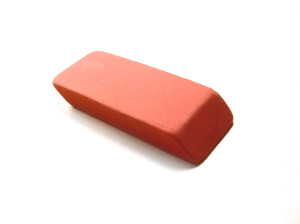The top 5 mistakes new writers make
 Unpublished? No problem.
Unpublished? No problem.
That doesn’t mean that your work is any less grand than the most popular author in the country—only that you’re as yet undiscovered.
Sometimes.
It is also true, all at the same time, that there are a few things that will keep even the most exciting writer from being taken seriously.
Below is a countdown of the most common reasons that some folks miss the boat.
5. The writer is too modest.
Regardless of how many writing credits you have (or don’t), never apologize for your work. Don’t tell the editor that your mother hates it, or that you only had a 2.3 GPA in college because you flunked English. Don’t even tell him that it is your first novel, unless he asks.
This is the time to play used-car-salesman with your inspired darling. The time for meekly coddling and nurturing your piece is over—think hard money, numbers, and marketing.
If you appear unprofessional, you’ll be brushed off.
It’s not a personal decision on the publisher’s behalf whether to buy your manuscript or story. They don’t care about your feelings or your inexperience.
It’s simply a business decision to purchase or pass on a single product—don’t make it any bigger of a deal than that.
4. The writer is too cocky.
No one wants to work with a difficult person. It never makes things easier in any industry.
If you try to play the cutesy card and act as if you’re God’s gift to the book world, all you’re going to earn is a few eyerolls and “Thanks, but not for us” form letters.
You’re not the next J.K. Rowling. You’re not Grisham, Crichton, nor Dan Brown. None of these authors garnered their publishing deals by writing smart-aleck letters claiming to be just like someone who preceded them.
Be yourself, but don’t be too loud.
Again, your words are your product.
If your first words to a company are brash and arrogant, no one is likely to want to see more of them.
3. The copy or query letter contains a grammatical error.
This is a biggie.
As an author, you are equipped with your life experiences, vocabulary, and written language skills as the only tools you’ve got.
If you can’t take the time to run a spell-check, read through the work a few times with a highlighter, or let a few friends proofread for you, then why should a busy publishing executive take her time to bother?
Yes, publishers have copy editors.
But they pay them well, and don’t want to waste a million man-hours having them look through problematic copy that’s riddled with mistakes and misspellings, which is exactly what they can expect from someone who didn’t even fix the obvious.
Your query letter should be no more than one page long.
Make it the best page you’ve ever written.
2. The author proves ignorance of company policies or editorial likes and dislikes.
You don’t send love poetry to the Atlantic Monthly.
You don’t send horse training tips to Time Magazine.
Entertainment Weekly isn’t going to be interested in crafts for Sunday School kids.
Sure, these are obvious. But do your homework!
It’s just as silly to send a story to an editor who has hated very similar stories in the recent past. Check the guidelines. Read the forums. Buy the previous issue, or rent it from your library.
If a publication says they hate poetry, don’t send them any! Don’t try to wow them with yours and sway their opinions; they’re allowed to hate poetry if they want to. Find someone else.
Maybe there’s a magazine that suits your topic perfectly. That’s swell. You still have to dig a little through some back issues to be sure that you aren’t sending them an article that they’ve already covered.
How many articles do you think the average magazine editor saw on how to buy gifts on a budget last Christmas? It might very well be a great idea floating around in that creative little head of yours, but unless you get there first, it’s still a no-go.
1. The author has never submitted in the first place.
You can’t sell what you’ve never shown them.
They can’t buy what they don’t know exists.
Learn the ropes, read the guidelines, gather as much advice as you can get your hands on, and write the best query letter you can possibly write.
But most importantly, send it off and wish it well.
Then start the next one, and go again.







I have to say that for the last couple of hours i have been hooked by the amazing posts on this site. Keep up the good work.